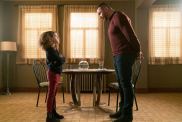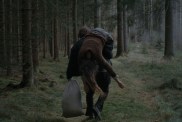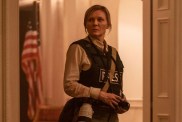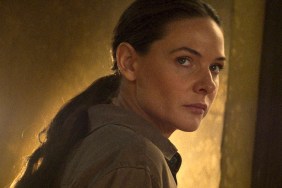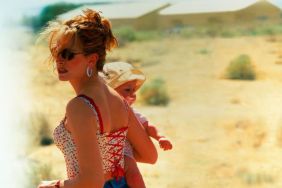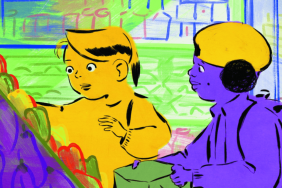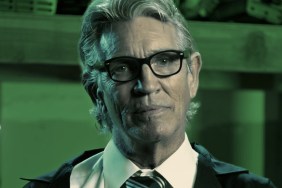
Brad Pitt and Marion Cotillard headline Allied, the latest from director Robert Zemeckis
Hitting theaters today from Paramount Pictures and New Regency is Allied, the latest feature film from director Robert Zemeckis. Zemeckis, whose credits include films like Contact, Cast Away, Who Framed Roger Rabbit and the Back to the Future trilogy, directs Brad Pitt and Marion Cotillard in the World War II thriller, which boasts a screenplay by Academy Award nominee Steven Knight (Dirty Pretty Things, Locke).
RELATED: Watch the New Allied Trailer
Allied follows Max Vatan (Pitt) and Marianne Beausejour (Cotillard), two assassins who fall in love during a mission in Casablanca in 1942 to kill a German ambassador. A future together, however, is thrown into tumult when twisty secrets from their pasts cast doubts on their love for each other. The movie also stars Lizzy Caplan (The Interview, Now You See Me 2), Matthew Goode (Stoker, Watchmen), Charlotte Hope (HBO‘s Game of Thrones) and Jared Harris (AMC‘s Mad Men, Sherlock Holmes: A Game of Shadows).
Robert Zemeckis recently sat down with CS to discuss Allied‘s path to the big screen and to reflect on how the new film relates to several others in his filmography. Read on for the full interview and, if you’ve already checked out Allied, let us know what you thought in the comments below!
CS: When did Allied first come your way?
Robert Zemeckis: I want to say maybe four years ago I was sent the script and I sparked to it immediately. It was really, really good!
CS: You have such an eclectic filmography and we’re always hearing that you’ve got a number of projects in development. How planned out is it in terms of moving from one film to another? Is there a method?
Robert Zemeckis: Not at all! (laughs) I don’t know how you could look at that body of work and think that there was a plan. It seems so random, doesn’t it?
CS: Yet your films themselves seem so precise. Do they tend to change much in the editing room?
Robert Zemeckis: They change in the editing room, but I don’t rearrange the story. I’m a very meticulous filmmaker. I shoot exactly what I need. I don’t shoot a bunch of stuff and then try to build the movie afterward. I don’t want to shoot any more than I absolutely have to.

CS: This is the third World War II film Brad Pitt has done recently. Is that something he was specifically looking for?
Robert Zemeckis: I don’t think so. He was asked that at this little panel we were on the other night. He said, “No, I have no World War II fetish.” He said it just happened that he got three in a row. I think it’s just coincidence.
CS: What ended up being the most difficult scene to get right?
Robert Zemeckis: There were some scenes that were more difficult. The climax took a while to do. Interestingly enough, for a directing standpoint, the most challenging scene from a directing standpoint was the party. There’s so much going on and that scene had to be laid out months in advance. We actually built the set to accommodate the story. The whole house was designed around how it would function to tell the story.
CS: What about Brad Pitt’s trick with the playing cards? Is that digital trickery or did he get really, really good at shuffling?
Robert Zemeckis: That’s all digital trickery (laughs).
CS: When did Marion Cotillard become a part of “Allied”?
Robert Zemeckis: I didn’t know this, but she had read the project a while back. I don’t even know if I was attached at that point. I offered it to her as soon as I became the director and she was my only choice. So I was thrilled she wanted to do it.
CS: There’s a recurring them in your films of time travel, most obviously in “Back to the Future,” but also in “A Christmas Carol” and thematically in “Contact” and “Forrest Gump,” where we see the same scenes at two different point in the lives of the leads. Period pieces like this one, though, are their own sort of time travel. Is that something you instinctively gravitate towards having in your films in one form or another?
Robert Zemeckis: It’s interesting. I think that one of the things that movies do better than any other medium is to take you to another time. A novel can do it, but movies are right there. That’s something that is really unique to the motion picture art form. You can create another time and immerse an audience in that. That’s part of the spectacle of movie making.
CS: How do you immerse yourself in that era?
Robert Zemeckis: I love that part. One of the great benefits of being a movie director is that you get to learn a lot of useless information about a great many things. I’m an expert on Lysander aircraft. I know a lot about SOE operatives. What do you want to know about the STEN gun? You immerse yourself in the stuff you need to know about the era. I was a World War II buff as a child. If you’re my generation, you can’t get enough of World War II. You learn more and more about certain things and, as soon as you read a screenplay and are loving the screenplay, you want to learn what was going on through documentaries and films of the era.
CS: Another film of yours that “Allied” really reminds me of is “What Lies Beneath.” It feels like there are similar explorations of trust in a marriage.
Robert Zemeckis: Oh yeah! That one for sure.
CS: It also had a lot of reflections in it. Many shots in both films have characters framed in mirrors.
Robert Zemeckis: Oh yeah. Mirrors in this play a major part because so much of the story is about illusion.

CS: I’m curious to know what your philosophy is on the difference between a true story and a story, like “Allied,” that could for all intents and purposes be a true story.
Robert Zemeckis: True stories are never as good. I mean, some are. My favorite true stories are the ones where you’re shaking your hand and saying, “If you made this as a movie no one would believe it.” Those are the really good ones. You see a documentary and go, “This is something crazy.” I think that, generally, stories that are fictional are more dramatic than nonfiction stories.
CS: And yet you move between both, having done “The Walk” just before this.
Robert Zemeckis: That was one where I heard the story and I just thought it was unbelievable that it was true. It was outrageous and had all the elements for a movie.
CS: There’s a neighbor in “Allied” named Mrs. Petit. Was that a reference to Philippe Petit?
Robert Zemeckis: You know, Steven Knight had that in there and had named her in the screenplay from day one. I didn’t put that in there as a reference to my movie. He actually called her that from the very beginning. But I took it!
CS: There’s a decidedly Alfred Hitchcock style to the way you approach a thriller. How directly is he an influence on you?
Robert Zemeckis: Well, he’s an influence on me because I subscribe to his philosophy on what a filmmaker is supposed to do. He is the master of telling a story filmically.
CS: Another heavy influence on “Allied” seems like it’s “Casablanca.” They’re literally in Casablanca for a time, but there’s a quality to the script that feels like the Michael Curtiz film. When Jared Hared says, “Show me your chickens, Max,” that’s a “Casablanca” line.
Robert Zemeckis: (Laughs) Yeah, it is. It’s also because it’s delivered in that English accent. But Steven Knight has a very specific voice. He has characters speaking that way. I couldn’t write a line like that, but he can. It works great.
CS: When did you meet Steven Knight for the first time?
Robert Zemeckis: That was when we hunkered down to start rewriting. I forget where we were. We were at some hotel here in LA. We were always rewriting the script in hotels all over the world. It was like, “Pleased to meet! Here’s my problem with act one…”
CS: Was there a lot that changed?
Robert Zemeckis: The love story between the main two never did and the structure of that story never did. That was always golden. There was a lot of plotting stuff that moved around. There was a lot of spy stuff and a lot of talking.
CS: Is it hard to strike the proper balance? On the one hand, it’s a spy thriller and on another it’s a romantic drama.
Robert Zemeckis: Oh yeah. The challenge for us was not having it become a detective story. We didn’t want to lay it on too much. It had to be first and foremost a love story.
CS: You had a period where you were working primarily with performance capture. Do you think of that as a period of your career that is past or might you do more?
Robert Zemeckis: Yeah! I mean, I don’t know. I loved working in that form. I just loved it. It was a great time for me. I don’t have any specific agenda but, if a story comes along and I think it could be best done with performance capture? There was a lot of performance capture in “The Walk.” There’s none in this movie, but a lot in “The Walk.” It’s just a tool.
Allied
-
Allied

-
Allied

Brad Pitt plays Max Vatan and Marion Cotillard plays Marianne Beausejour in Allied from Paramount Pictures.
-
Allied

Brad Pitt plays Max Vatan and Marion Cotillard plays Marianne Beausejour in Allied from Paramount Pictures.
-
Allied

Brad Pitt plays Max Vatan and Marion Cotillard plays Marianne Beausejour in Allied from Paramount Pictures.
-
Allied

-
Allied

-
Allied

